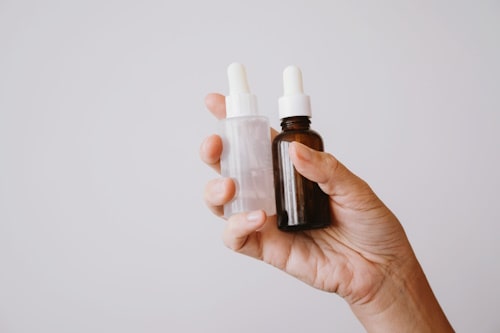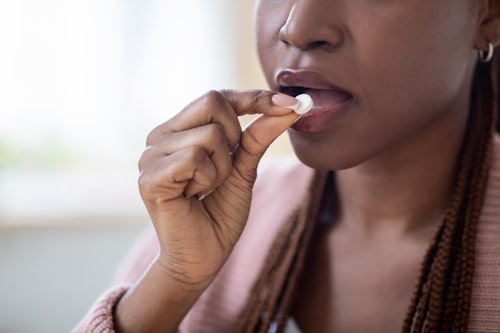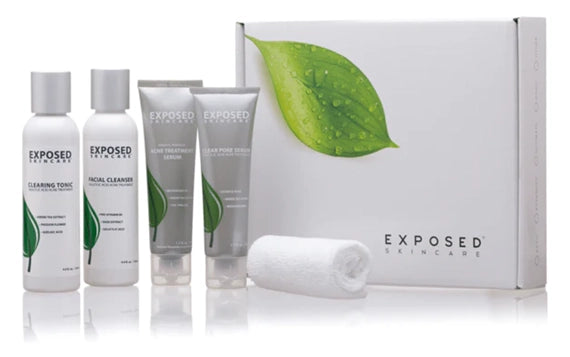Cystic acne, a severe form of acne, can be challenging to manage. This type of acne is characterized by deep, inflamed, and often painful cysts under the skin.
It's not just a typical pimple or a mild breakout; it's an intense and often persistent form of acne that requires specialized care. In this detailed exploration, we'll dive into the five best severe cystic acne treatments to help you achieve clearer skin.
Also read: How to choose the best acne treatment
Biggest Take-Aways:
- Cystic acne is a complex condition requiring a multifaceted treatment approach, often involving both over-the-counter and prescription medications.
- Key ingredients like benzoyl peroxide and salicylic acid are crucial in managing severe acne by targeting bacteria and unclogging pores.
- Lifestyle factors, including diet and stress management, are important in preventing and managing acne outbreaks.
- Exposed Skin Care stands out for its combination of scientific and natural ingredients, offering a balanced and effective solution for acne treatment.

Understanding Cystic Acne
Before delving into treatments, it's crucial to understand what cystic acne is and why it's different from other types of acne. Cystic acne is a severe inflammatory acne marked by large, red, tender pus-filled bumps.
It's caused by a combination of factors, including hormonal changes, bacteria, excess oil production, and dead skin cells clogging pores.
Why Cystic Acne is More Challenging to Treat
- Depth of the Acne Cysts: Cystic pimples are rooted deep within the skin.
- Risk of Acne Scarring: Untreated cystic acne can lead to significant scarring.
- Painful Acne Flares: The inflammation makes cystic acne particularly painful.
The 5 Best Treatments for Severe Cystic Acne
Now, let's explore the top treatments that can help manage this severe acne.
1. Benzoyl Peroxide – The Bacteria Buster
Benzoyl peroxide is a well-known acne treatment that can be particularly effective for cystic acne. It kills acne-causing bacteria and helps treat and prevent acne breakouts.
- How it Works: Benzoyl peroxide introduces oxygen into the pores, which kills the bacteria (Propionibacterium acnes) responsible for acne.
- Application: It's available in various formulations, including cleansers, creams, and spot treatments.
- Consideration: Starting with a lower concentration is essential to minimize skin irritation.
2. Salicylic Acid – The Pore Cleaner
Salicylic acid is another effective treatment for severe cystic acne. It belongs to a class of drugs known as salicylates and works by exfoliating the skin and unclogging pores.
- Action: It helps to break down the bonds between dead skin cells, allowing them to shed more effectively.
- Products: Available in cleansers, toners, and spot treatments.
- Note: Overuse can lead to skin dryness, so it's crucial to balance its use with hydrating skincare products.

3. Topical Retinoids – The Skin Renewers
Topical retinoids, derivatives of Vitamin A, are often prescribed for their ability to renew skin cells and reduce inflammation.
- Mechanism: They promote cell turnover, preventing dead skin cells from clogging pores.
- Types: Common forms include tretinoin, adapalene, and tazarotene.
- Application Tips: Should be used in the evening and requires regular use for best results.
4. Oral Antibiotics – The Inflammation Fighters
For severe cystic acne, oral antibiotics can be an effective treatment option if topical methods don't seem to help. They work by reducing bacteria and fighting inflammation.
- Common Antibiotics: Includes doxycycline, minocycline, and erythromycin.
- Duration: Usually prescribed for a limited period to reduce the risk of antibiotic resistance.
- Combination Therapy: Often combined with other acne treatments for a comprehensive approach.

Complementary Strategies for Managing Severe Cystic Acne
In addition to the primary treatments, several complementary strategies can be incorporated into your acne skin-care routine.
Regular Cleansing
- Importance: Keeping the skin clean helps to remove excess oil and dead skin cells.
- Recommended Products: Gentle cleansers ideally with salicylic acid.
Healthy Diet and Hydration
- Dietary Adjustments: Eating a balanced diet and staying hydrated can support skin health. Probiotics can help as well as limiting sugar intake.
- Avoiding Triggers: Some individuals find that certain foods can worsen their acne.
Stress Management
- Impact of Stress: High-stress levels can exacerbate acne.
- Relaxation Techniques: Activities like yoga, meditation, or regular exercise can help manage stress.
Avoiding Harsh Skincare Products
- Gentle Approach: Harsh skincare products can irritate the skin and aggravate acne.
- Choosing Products: Opt for non-comedogenic and fragrance-free products.
Benefits of Using Exposed Skin Care for Acne Management
Exposed Skin Care offers a comprehensive approach to managing both common acne causes and severe acne. It stands out due to its unique blend of scientific and natural ingredients.
Here's why it's effective, especially in treating cystic acne:
- Balanced Formula: Combines science and nature, using ingredients like benzoyl peroxide and salicylic acid alongside natural extracts like green tea and licorice root. This balance helps in addressing acne causes without over-drying the skin.
- Targeting Cystic Acne: Its formulations penetrate deeply to treat cystic acne, targeting the root cause of cystic acne. Reaching deeper skin layers effectively reduces inflammation and prevents future breakouts.
- Gentle Skin Care: Exposed Skin Care is designed to be gentle for daily use. A regular routine, including washing your face with their cleanser, doesn't strip the skin of essential oils, reducing the chance of irritation that can cause acne.
- Prevents Acne Recurrence: Regular use helps in maintaining clear skin and preventing new acne. It addresses factors that acne may aggravate, ensuring long-term results.
- Suitable for All Skin Types: Its non-comedogenic nature makes it suitable for all skin types, from oily to sensitive, effectively reducing acne trends without causing additional skin issues.
Exposed Skin Care, thus, provides an all-encompassing solution for those struggling with severe acne, offering a practical and effective way to treat and manage skin concerns.
Conclusion
The journey to get rid of cystic acne, a severe type of acne characterized by deep, pus-filled acne cysts, often feels daunting. Understanding cystic acne causes is pivotal in selecting the right treatment plan.
For many, this journey begins with over-the-counter products or topical treatments specifically formulated to target the deep-rooted issues causing acne and cystic acne.
However, when cystic acne persists, more potent acne medications may be required. This can include more intensive cystic acne treatments, such as oral medications or hormonal treatments.
These options can help treat cystic acne from the inside out, targeting the inflammatory processes that lead to nodular and cystic acne breakouts. It’s important to remember that each type of treatment may vary in effectiveness depending on the individual's unique skin condition.
A comprehensive approach is often necessary for those struggling with acne on the back or more widespread areas. This can include a combination of topical treatments, systemic medications, and lifestyle changes to prevent cystic acne and manage symptoms effectively.
With its dual approach combining natural ingredients and scientific formulations, Exposed Skin Care offers an effective solution for managing acne and preventing future breakouts. When it comes to cystic acne, a condition that can cause significant distress and impact quality of life, finding the right combination of treatments is key.
FAQs
What Causes Cystic Acne?
Cystic acne is caused by hormonal changes, bacteria, excess oil production, and dead skin cells clogging pores.
Can Over-the-Counter Products Treat Cystic Acne?
Over-the-counter products, especially benzoyl peroxide or salicylic acid, can effectively treat mild to moderate cystic acne.
Are Prescription Medications Necessary for Cystic Acne?
In severe cases of cystic acne, prescription medications, such as oral antibiotics or topical retinoids, may be necessary to treat the condition effectively.
Can Lifestyle Changes Help with Cystic Acne?
Yes, lifestyle changes such as maintaining a healthy diet, reducing stress, and practicing proper skin care can help manage and prevent cystic acne.
What Makes Exposed Skin Care Effective for Acne Treatment?
Exposed Skin Care combines scientific and natural ingredients, effectively treating acne by targeting bacteria, reducing inflammation, and preventing future breakouts.


















